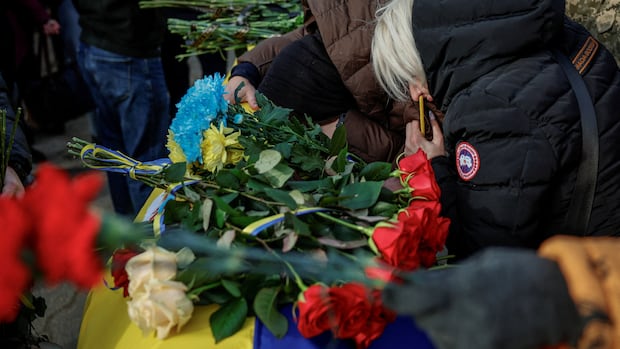Ukraine Peace Deal Deadline Looms: US-Brokered Talks Face Key Obstacles Amidst European Calls for Pressure & Security Guarantees
 Ukraine
International Relations
Ukraine
International Relations

A US-brokered Ukraine peace deal deadline nears amid unresolved issues like territory and security guarantees. Allies discuss frozen Russian assets for aid. Zel
Ukraine Peace Deal: Deadline Looms Amidst Complex Diplomatic Efforts
The U.S.-brokered peace agreement for Ukraine is facing a critical deadline of November 25, prompting intense diplomatic activity. Despite ongoing discussions, significant obstacles persist, particularly regarding the highly contentious issue of territorial concessions to Russia.
Diplomatic Maneuvers and Key Players Shape Discussions
A "coalition of the willing," including nations like Canada, convened virtually on Tuesday to address pivotal aspects of the peace process. A central theme was the potential utilization of frozen Russian assets to contribute to Ukraine's recovery and financial stability.
Ukrainian President Volodymyr Zelenskyy has voiced his readiness to engage in a meeting with U.S. President Donald Trump, but he firmly insists on the inclusion of European leaders in these crucial talks. This diplomatic push coincides with reports detailing U.S. Army Secretary Dan Driscoll's meeting with Russian officials in Abu Dhabi, indicative of behind-the-scenes negotiations. The tragic reality of the conflict was underscored by recent overnight Russian attacks in Kyiv, which resulted in at least seven fatalities.
French President Emmanuel Macron, a prominent European voice, participated in the virtual coalition meeting from Paris. Following the discussions, Macron highlighted that European allies collectively urged Western nations to maintain unwavering pressure on Russia throughout the negotiations. He underscored the critical importance of "robust security guarantees" to ensure the peace deal does not devolve into a form of "capitulation." President Zelenskyy echoed this sentiment, proposing the establishment of a post-war "reassurance force" composed of European countries, specifically designed to deter any future Russian aggression.
The Pivotal Role of Frozen Russian Assets
From Johannesburg, European Commission President Ursula von der Leyen reinforced Macron's call for the repurposing of immobilized Russian sovereign assets to provide essential financial support for Ukraine. She notably pointed out the participation of U.S. Secretary of State Marco Rubio in the coalition call, marking a significant first for American involvement and emphasizing the vital transatlantic cooperation necessary for a successful resolution. Von der Leyen also noted that existing sanctions have already significantly hampered Russia's capacity to finance its ongoing war efforts. Furthermore, France and Britain, in collaboration with Turkey and the United States, are slated to spearhead a working group dedicated to solidifying these indispensable security guarantees.
Zelenskyy's Delicate Diplomatic Balance
President Zelenskyy is currently navigating a complex diplomatic landscape, particularly concerning his often-turbulent relationship with President Trump. While expressing willingness to discuss "sensitive points" of the peace proposal directly with Trump, past interactions – including a critical tweet from Trump questioning Ukraine's "zero gratitude" – highlight the intricate balance required. A recent meeting at the Vatican, held on the sidelines of Pope Francis’s funeral, reportedly helped to improve their relationship, yet Kyiv remains acutely aware of the paramount importance of securing continued White House support.
Contention Surrounds Peace Plan Details
White House spokesperson Karoline Leavitt conveyed optimism regarding "tremendous progress" towards a resolution, although she acknowledged the presence of "delicate, but not insurmountable, details" that necessitate further discussion. The U.S.'s 28-point plan, reportedly endorsed by Russia, offers "reliable security guarantees" but explicitly rules out NATO troops on Ukrainian territory. Instead, it proposes the stationing of European fighter jets in neighboring Poland and outlines a commitment to a "decisive and co-ordinated military response" in the event of any renewed Russian invasion.
Concerns persist among Ukraine's allies that President Trump’s peace framework might be overly favorable to Russia. However, Christian Leuprecht, a professor at the Royal Military College and Queen’s University, posits that given Ukraine's current position, the deal represents a "significant opportunity" for both sides to achieve reasonable objectives. Unofficial reports of European counter-proposals suggest an immediate ceasefire and U.S. security guarantees mirroring NATO's Article 5. Meanwhile, British Prime Minister Keir Starmer confirmed the United Kingdom's commitment to sending additional air defense missiles to Ukraine, reinforcing the collective military assistance from allies. French President Macron also indicated forthcoming plans to bolster France's army, citing Russia's "hybrid confrontation" as a key motivator.
The path to lasting peace remains challenging, with the looming November 25 deadline serving as a critical juncture for intensified international diplomatic efforts.